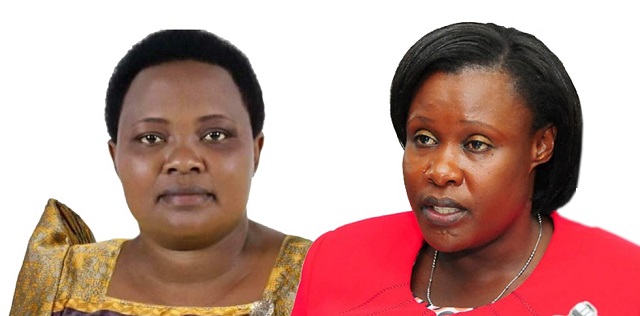
But opposition says new Vice President, Prime Minister deserve chance
Kampala, Uganda | IAN KATUSIIME | Katakwi and Kakumiro; two districts from where Uganda’s Vice President and Prime Minister have emerged and where the re-alignment of Uganda’s cabinet has been centered. President Yoweri Museveni rewarded the Teso sub-region which resoundingly voted for him by picking Jessica Alupo, Katakwi Woman MP, fresh from political oblivion, as vice president.
For the first time, a woman will be a heartbeat away from the presidency at a time of intense discussion and maneuvering on the succession of President Museveni. As age has taken a toll on Museveni, palace squabbles on who has closest proximity to power have intensified.
The constitution of Uganda in Article 109 titled “Absence of the President” states that the vice president will assume power in the event of the president’s death pending a presidential election in six months.
When Specioza Wandira Kazibwe was vice president from 1994-2003, the Museveni administration was still taking shape and the body politic was not as toxic and fragile as today. Alupo, a former minister of education and retired major in the army, has already pledged her loyalty to the appointing authority in an apparent display of what the job entails.
Museveni critic Miria Matembe, former Minister for ethics and integrity and a woman activist says she has no faith and hope in the Museveni cabinet. “Gender balance is about tapping experience and ability to make it effectively influence decisions and make them human responsive,” she said.
In Uganda, as in many countries, there is no defined role of a vice president and it is up to the occupant to make the most of it.
In elevating Alupo to the vice presidency, Museveni made overt political gestures after nearly twenty years of men from the central region basking in the position albeit with different personalities and ambitions.
The appointment of two women as the country’s Number Two and Leader of Government Business in Parliament (Prime minister) has been dismissed as tokenism by some sections of the women’s movement. The close association of Alupo and Nabbanja to the ruling party, they say is mere representation without furtherance of the women’s agenda in any substantive terms.
In picking Robinah Nabbanja, an avowed Museveni loyalist but inexperienced cadre, to steer cabinet as Prime Minister, Museveni stirred debate on the job description of the position and capabilities of the office holder.
Nabbanja, the Kakumiro Woman MP, has been serving as minister of state for health general duties since early last year. Her most visible dealings were with health workers on issues of allowances and disbursement of medical equipment. The appointment of Nabbanja has elicited the most debate among all appointees.
Museveni in his speech after the budget reading defended the choice with the Biblical analogy of Jesus Christ working with fishermen. His fishermen analogy has instead fueled the debate.
However some say the Prime Minister just like other ministers work on directives from State House and Nabbanja should not be looked at any differently. Her predecessors were relatively more experienced however numerous scandals broke out on their watch at least the most immediate ones.
Mathias Mpuuga, the Leader of Opposition in Parliament (LOP), who is going to interface with Nabbanja directly when she takes office as Prime Minister and leader of government business in parliament says she deserves a chance. “She is their pick. I cannot comment on her qualities. The appointing authority sees what we do not see or knows what we do not know,” Mpuuga said in an interview with The Independent.
Mpuuga says however that he will challenge Nabbanja on the human rights abuses in the country, the rule of law and the “general maladministration”. He adds, “I will pick her brain on the promises that the government has made to citizens and challenge her on corruption which is an official arm of government.”
The new LOP says his counterpart on the other side could make a difference. “She has her own orientation. Depending on how much space her boss gives her…if you have an overbearing boss like him [Museveni], it can be tricky.”
The Office of Prime Minister (OPM) is a busy one tasked with rollout of government programmes. It houses a number of ministries including critical ones like Relief and Disaster Preparedness. Other significant programmes include emergency response and refugee management which deals directly with high level organisations like the UN and other donors.
Also from the same region as Alupo, is Maj. Gen. Jeje Odongo, appointed as minister for foreign affairs. As Uganda’s next top diplomat, Odongo’s work is cut out. The government is battling a wave of sanctions and travel bans among its top echelons. His military background however could hamper his work given that top on the sanctioned lot are military commanders accused of human rights abuses before and after the 2021 elections.
Museveni’s reliance on army cadres was again on display with the elevation of Chief of Defence Forces Gen. David Muhoozi to minister of state for internal affairs. The docket is at the intersection of dealing with the opposition because it the mother ministry of the Uganda Police and of late has been a ministry known for targeting activist NGOs.
Maj. Gen (Rtd) Kahinda Otafiire, Museveni’s bush war comrade and well known for his pugnacity, is the senior minister in the docket signaling the hand the President wants to deal with the opposition forces encapsulated in the People Power Movement under Bobi Wine.
 The Independent Uganda: You get the Truth we Pay the Price
The Independent Uganda: You get the Truth we Pay the Price


